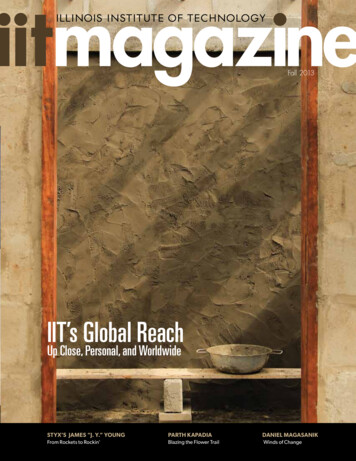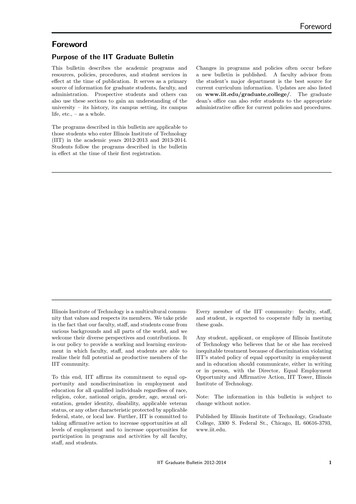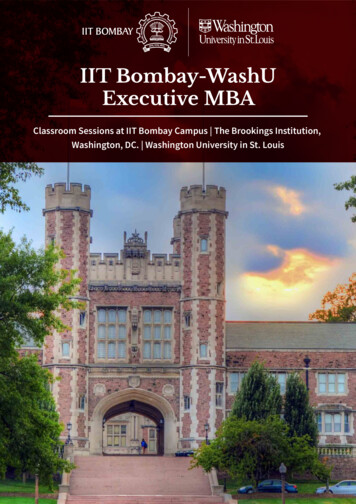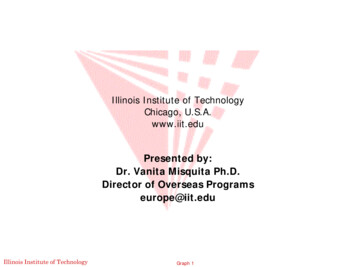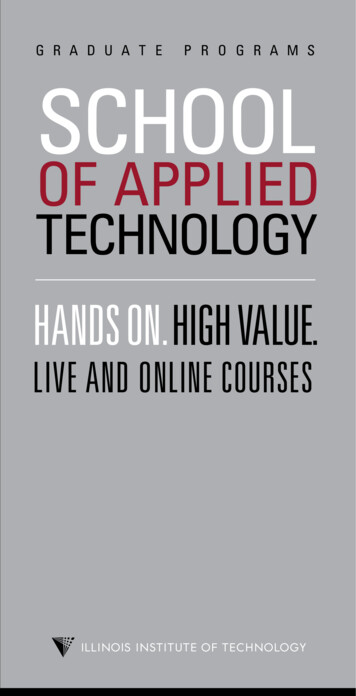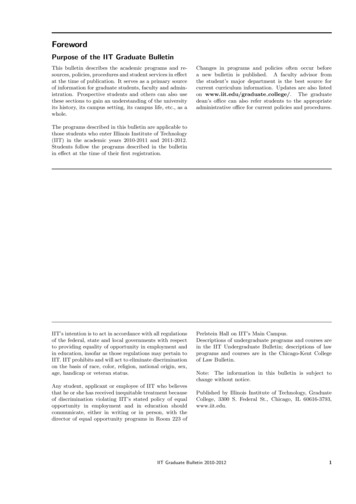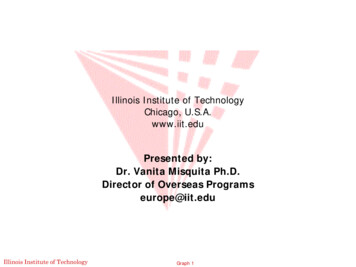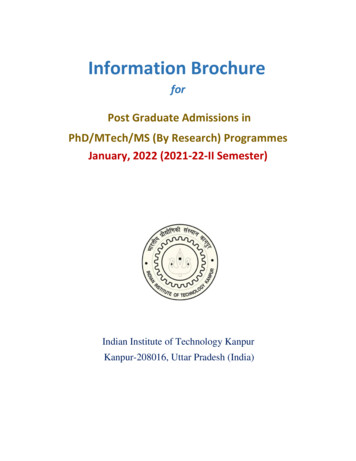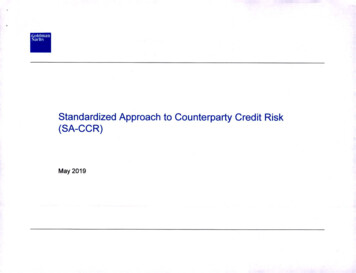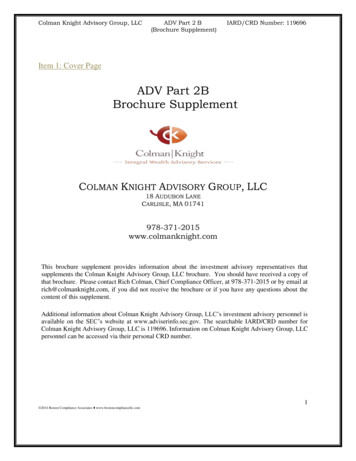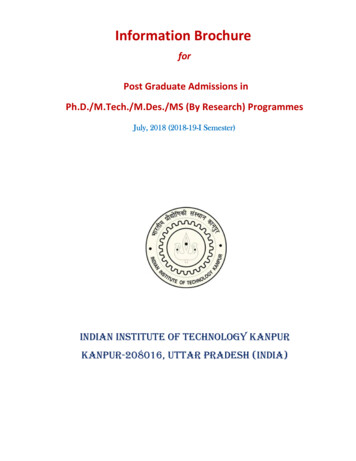
Transcription
Information BrochureforPost Graduate Admissions inPh.D./M.Tech./M.Des./MS (By Research) ProgrammesJuly, 2018 (2018-19-I Semester)INDIAN INSTITUTE OF TECHNOLOGY KANPURKANPUR-208016, UTTAR PRADESH (INDIA)
AEROSPACE raduate (UG) and postgraduate (PG) levels leading to BTech, B Tech-M Tech dual, M Tech, MS (research) and PhDdegrees. The specializations associated to the PG programs areavailable in four major streams: (i) Aerodynamics, (ii)Propulsion, (iii) Flight Mechanics, (iv) Structures.The Department is actively involved in sponsored R&D andconsultancy projects funded by a range of defense and civil organizations. Some of them are, Aeronautics R&DBoard, DRDO, ISRO, HAL, NAL, ADA, DST, Delhi Metro Railways Corporation, NAL, Indo-French Centre forthe Promotion of Advanced Research (IFCPAR), TERI, PCRA, etc.FACULTYA. C. Mandal, PhD (IISc Bangalore):ExperimentalAerodynamics, Flow instability and transition, TurbulentShear flow.A. K. Ghosh, PhD (IITK): Flight Mechanics, NeuralNetworks, Flight Testing.A. Tewari, PhD (Missouri-Rolla): Flight Mechanics,Aeroservoelasticity, Space Dynamics and bustion, Liquid Atomization, Flow Control.Ashoke De, Ph.D (LSU): CFD, Turbulent combustion, Gas turbine propulsion.Abhishek, PhD (Maryland): Helicopter Aeromechanics, Multibody Dynamics, Micro Air Vehicles.Ajay Vikram Singh, PhD (University of Maryland College Park): Combustion and Reacting Flows, CombustionGenerated Functional Nanoparticles, Soot Formation and Oxidation, Fire Dynamics, Detonations and Explosions.C. S. Upadhyay, PhD (Texas A&M): Computational Mechanics, Damage Mechanics.C. Venkatesan, PhD (IISc Bangalore): Helicopter Dynamics and Aeroelasticity, Autonomous Helicopter, SmartStructures.Debopam Das, PhD (IISc Bangalore): Theoretical and Experimental Fluid Dynamics, Aeroacoustics, Instability &transition, Vortex Dynamics. Unsteady Aerodynamics, Bird's and Insect's Flight.
D. P. Mishra, PhD (IISc Bangalore): Combustion, CFD ofChemically Reacting Flows, Propulsion, Heat Transfer.E. Rathakrishnan, PhD (IIT Madras): Fluid Mechanics, GasDynamics, Applied Gas Dynamics, Experimental Techniques inFluid Mechanics.G. M. Kamath, PhD (University of Maryland, College Park):Structural Health Monitoring, Composite Materials ng,Machine Learning, Aeroelasticity.Kamal Poddar, PhD (UC, San Diego): Aerodynamics, Turbulence, Low and High Speed Flows.Mangal Kothari, PhD (University of Leicester): Optimal Control, Nonlinear and Adaptive Control, Flight VehicleGuidance and Control, State Estimation, Motion Planning and Cooperative Control.Mohammed Ibrahim Sugarno, PhD (IISc Bangalore): Experimental Hypersonic Aerothermodynamics, HighEnthalpy Test Facilities, Shock Waves.Pritam Chakraborty, PhD (Ohio State University): Mesoscale mechanics for plasticity, fatigue, creep andfracture; FEM; Multi-scale methods.P. M. Mohite, PhD (IIT Kanpur): Damage Mechanics of Laminated Composites, Composites, Finite ElementAnalysis.R. Kitey, PhD (Auburn University): Fracture Mechanics, Composite Materials, Experimental Stress Analysis,Optical Metrology, Thin Films, Finite Element Method.Raghavendra P. Kukillaya , PhD (Princeton University, New Jersey, USA): Aircraft and Airship FlightDynamics and Control, Systems Modelling, Simulation and Design, Optimal Control, Biomechanics.Rakesh Kumar, PhD (Penn State): Hypersonics, Rarefied Gas Dynamics, Microfluidics, Molecular Dynamics,Heat Transfer & Thermal Design.S. Kamle, PhD (Purdue): Experimental Stress Analysis, Smart Materials.Sanjay Mittal, PhD (Minnesota): Unsteady Aerodynamics, CFD, FEM, Low speed Wind-Tunnel Testing, BluffBody Flows, Shape Optimization, Sports Balls, Flows in air intakes.Sanjay Kumar, PhD (Caltech): Fluid Mechanics - bluff body wakes, shock-accelerated flows, shock waves,shock tubes.Sathesh Mariappan, PhD (IIT Madras): Fundamentals of thermoacoustic interactions, Application of dynamicalsystems' theory to thermo fluid systems, Optical flow diagnostics, Acoustic measurements.S. Saderla, PhD (IIT Kanpur): Online System Identification, UAV Design and Flight tests, Experimental Flightdynamics.Tapan K. Sengupta, PhD (Georgia Tech): Transition and Turbulence, CFD, AerodynamicsVaibhav Arghode, PhD (University of Maryland, College Park): Combustion, Heat Transfer, Fluid Mechanics,Experimental Methods, Computational Fluid Dynamics.
PROGRAMS AND ADMISSIONThe masters programs are designed to impart students roductory and advanced level courses, followed by theresearch within their field of specialization. The doctoralprogram is aimed at assisting students acquiring proficiencyin their chosen area of research through comprehensivecourse work and extensive in-depth research. All PGprograms culminate into thesis/dissertation.The Department of Aerospace Engineering accepts students from various disciplines for its PG program. Thedetailed admission procedure along with the eligibility criteria is specified at http://www.iitk.ac.in/doaa/admissionprocedure. Some of the key information in regards to the application is mentioned below.M.Tech: Candidates with a valid GATE score and the degree in oneof the following disciplines can apply for the M Tech Aerospace,Mechanical, Automobile, Production, Civil, Chemical, csandCommunication, Metallurgy / Metallurgy & Material Science,Instrumentation, MechatronicsScience: Four years BS degree in Physics, Mathematics OR MScdegree in Physics, Mathematics and Engineering Physics with validGATE scoreThe requirement of GATE score is waived off for the external and sponsored candidates.M.S. (Research): Candidates with B Tech/BS (4-year)/M. Sc. degrees and a valid GATE score can apply for thisprogram. The GATE score is waived off for the external and sponsored candidates.B. Tech-M. Tech Dual: Students in B. Tech program at IITK can apply for B Tech-M Tech Dual degree programduring his/her third year of the course work.PhD: Candidates with following degree can apply for the PhD program.-Masters degree in engineering-Masters degree in science with a valid GATE/UGC/CSIR score-Excellent academic record in B. Tech program and a valid GATE score (Application can be sent during thefinal year or after completing the B. Tech program). The GATE score is waived off for the students fromCFTIs.Sponsored/External/Part time candidate should have a minimum 2 years of R&D experience (or relevant) in thefield of Aerospace Engineering.
COURSESA student is admitted to the post graduate program in one of the fourmajor streams (Aerodynamics / Propulsion / Flight Mechanics /Structures). Based on the departmental policies the student will beallocated a thesis supervisor/s during the first semester of theprogram. In case the student is working on a multidisciplinaryproblem appropriate guidance/assistance will be provided by thedepartment.A student admitted in M. Tech program is required tocomplete a minimum 72 units of course work (equivalentof 8 courses) to a satisfactory level. The respectiverequirement for the M.S.(Research) students is 36 units. Astudent admitted in a PhD program is required to completea minimum of 36 units of course work (equivalent of sive examination. Depending upon the area ofspecialization the student will be advised by DPGC/ThesisSupervisor to register for the required courses.LABORATORIES AND FACILITIESThe department has several well established laboratoriesfocusingvarious research and academic activities. They are: High SpeedandonLowSpeed Aerodynamics Lab, Propulsion Lab, Combustion Lab,AdvancedCombustion and Acoustics Lab, Fire Lab, ComputationalPropulsionLab, Structures and Advanced Materials Characterization Lab,StructuralAnalysis Lab, Aeromodeling Lab, Unsteady AerodynamicsLab,Autonomous Helicopter Lab, CFD Lab, High PerformanceComputingLab, Fluid Mechanics Lab, Flight Lab and National WindTunnelFacility (3 m x 2.25 m test section).The experimental facilities in these labs include, low speed wind tunnels, high speed blow down tunnel, high speedjet facility, water tunnel, soap film tunnel, anechoic chamber for noise measurements, hot wire and laser Doppleranemometry; cascade tunnel, continuous combustion unit and gas turbine test rig; Malvern Spraytech particle sizeanalyzer, Gas Chromatograph; UTMs, Dynammic Impactor, DMA, DSC, TGA, TMA, Thermal evaporator, Spincoater, Phased Array Scanner, Autoclave, Prepreg forming, Laser spallation, Michelson Interferometer; Flightlaboratory, with four powered airplanes and several gliders with an operational aerodrome for flight research.
BIOLOGICAL SCIENCES AND BIO ENGINEERINGThe Department of Biological Sciences and Bioengineering (BSBE) was established in September, 2001. Thedepartment offers both undergraduate (B.Tech) and postgraduate programs (M.Tech. and Ph.D.) and the facultyconduct research in diverse areas of basic and applied biology. Ongoing research projects are spread in broadlythree major domains that include (a) molecular, cellular and developmental biology, (b) structural andcomputational biology and (c) bioengineering. A major emphasis is on understanding the fundamental aspects ofcell differentiation and growth, regenerative medicine, elucidating protein structure-function relationship, andengineering approaches to understand complex biological systems. The department has attracted funding frommajor national and international agencies including the Wellcome-DBT India Alliance, Indo-UK Science bridgeprogram, UKERI, DBT, DST, CSIR, DAE, ICMR and DRDO to name a few. BSBE faculty and student membershave received many awards and honors in recognition of their excellence in research.The department currently has fourteen members in its faculty with expertise in diverse areas of research.FACULTYAmitabha Bandyopadhyay, Ph.D. (Albert Einstein College of Medicine, New York): skeletal developmentand differentiation; metabolomics.Arun K. Shukla, PhD (Max Planck Institute of Biophysics, Frankfurt, Germany): Structural biology ofmembrane proteins, cellular signaling and combinatorial biology.Ashok Kumar, Ph.D.(IIT Roorkee):Biomaterials, tissue engineering, regenerative medicine,nanobiotechnology, stem cell research, drug screening and delivery, cryogel technology bioprocess engineeringand environmental sciences.Ashwani Kumar Thakur, Ph.D. (Inst. of Microbial Tech., Chandigarh) : Protein aggregation in diseases andtherapeutic design, self assembly of proteins, and biopharmaceuticals.Bushra Ateeq, Ph.D. (AMU, Aligarh): Molecular oncology, Genetic alterations, Cancer pathogenesis, diagnosisand therapeuticsDhirendra S. Katti, Ph.D. (Bombay Univ.): Tissue engineering, biomaterials, drug delivery systems andnanobiotechnology.Ganesh S, Ph.D. (BHU, Varanasi): Neurobiology of disorders, stress biology, and human genetics.Jayandharan G Rao, Ph.D (Christian Medical College, Vellore): Gene therapy; human molecular genetics;Jonaki Sen, Ph.D. (Albert Einstein College of Medicine, New York): Morphogenesis and differentiation of theretina and various regions of the brain; vertebrate developmental neurobiology.Mainak Das, Ph.D. (Univ. of Central Florida, Orlando): Bioelectronics, Green Energy, Physiology & SensorNitin Gupta, Ph.D (University of California, San Diego): Neurophysiology; computational biologyPradip Sinha, Ph.D. (BHU, Varanasi): Cancer genetics, growth control & pattern formation in fruit fly,Drosophila model.
Sankararamakrishnan R, Ph.D. (IISc, Bangalore): Bioinformatics, molecular modelling of membrane proteinsand biomolecular simulation.Saravanan M, Ph.D. (IISc, Bangalore): Chromatin remodeling and Mycobacterial DNA repair.FACILITIESBSBE offers its members with a wide variety of high-end equipments. Some of these include bioinformaticsfacility (servers, workstations, and software modules for high performance computing), material characterizationfacility (SEM, micro-CT, rheometer, mechanical testing and fabrication facilities), cell sorting and imaging facility(cell sorter, confocal microscope), genomic facility (DNA sequencer, microarray scanner and real-time PCRmachines), centrifuge facility (ultra-speed, large volume and multipurpose centrifuges), protein purification andcharacterization facility (Chromatography, HPLC and FPLC systems), protein crystallization facility (X-ray datacollection facility with cryo cooling features), tissue culture facility (culture rooms for cell, organ and viruscultures), histopathology facility (tissue processing unit, automated microtome, and cryostat), and a transgenicfacility (transgenic facility for mouse, chicken, Drosophila, C.elegans and zebra fish).M.Tech. in BSBE (4 Semesters)Master of Technology (M.Tech.) program in BSBE meets a variety of career objectivesindustry. Theprogramisinresearchandalso supported by the Department of Biotechnology (DBT), Govt. of India. TheProgram is for four semesters of which the last two semesters involve hands-on training and research.Midway through the program, students may apply for switchover to the Ph.D. program of BSBE. Theprogram is designed for students from both biology and non-biology background.WHO CAN APPLY?Candidates who have a Master's degree in any area of science (mathematics, physics, chemistry or life sciences) orBachelor’s degree (4 year program) - Bachelor's degree in Technology/Engineering, Medicine (MBBS),Pharmaceutical (B.Pharm.), Agricultural or Veterinary Sciences are eligible to apply. Applicants should havesecured a minimum CPI of 6.0 (or 60 percent marks) in their qualifying degree (and should be at least sevenpercent higher than the minimum pass marks/CPI) and should either have a valid GATE score or qualified in thenational level tests conducted by the UGC, CSIR, DBT, ICAR or ICMR. The requirement of a GATE score iswaived for M.B.B.S. degree holders and for engineering graduates from IITs with an overall CGPA of 6.5and a CGPA of 8.0 during the last two semesters. Candidates appearing in the final examinations of thequalifying degree are also eligible to apply.Ph.D in BSBEPh.D. Program in BSBE is intended for students interested in carrying out distinguished scholarly activities.Excellence in research apart, the program envisages comprehensive development of students for leadership inscience and engineering in both industry and academia. Therefore, the Ph.D. Program involves intense coursework covering diverse areas of biology and bioengineering for competence in both analytical and quantitativeskills.WHO CAN APPLY?Candidates should meet one of the following 4 conditions. Candidates appearing in the final examinations of thequalifying degree are also eligible to apply.
(1) Should have a master’s degree in engineering (ME/M.Tech.), or medicine (M.D.) or M.Sc. (Agri) or equivalentwith minimum of 55 percent marks/ 5.5 CPI (on a 10 point scale) as long as it is not less than the minimum passmarks/CPI.OR(2) Should have a bachelor’s degree in engineering (B.E/B.Tech) or pharmacy (B.Pharm) or Bachelor’sdegree (4 year program) with a minimum of 75 percent marks/7.5 CPI, and a valid GATE score or qualified in theJRF of UGC, CSIR, DBT, ICAR or ICMR. The requirement of GATE score is waived for candidates withbachelor's degree in engineering from the centrally funded technical institutes (CFTIs).OR(3) Master’s degree in sciences or an allied area (M.Sc.), satisfying each of the following criteria may also beconsidered.(a) a minimum of 65 percent marks/6.5 CPI in the master’s degree.(b) first division in bachelor’s degree, and(c) UGC, CSIR, DBT, ICAR or ICMR junior research fellowship (JRF) OR 95 percentile or higher in GATE.OR(4) MBBS degree holders with a minimum of 60% marks in the qualifying degree.
CHEMICAL ENGINEERINGThe Department of Chemical Engineering is among the five departments established at the inception of IIT Kanpurin 1960. Along with the other pioneer departments, it ushered in a new paradigm in undergraduate engineeringeducation that fosters the creative thinking process in a very open and vibrant academic environment. From anearly emphasis on developing and perfecting the undergraduate curriculum to nurturing a fledgling post-graduateresearch program to significantly contributing to applied and fundamental ChE research, we have grown fromstrength-to-strength over the past five decades.A hallmark of our Department is the emphasis on quality education as reflected in the over 36 “labor of love”textbooks written by our faculty, many receiving international acceptance. This is complemented by a strongresearch ethos, carefully nurtured by the pioneers and effectively passed on from one generation to the next. Thesignificant post-liberalization research funding has brought in a critical mass of young, talented and motivatedfaculty immersed in research in the frontier areas of complex fluids, micro-reactors, nano-technology, adhesion,molecular simulations and biocomputation and energy systems. This is in addition to research in traditional areasof fluid dynamics, conventional/new separation processes, catalysis, polymer engineering and process design,control and intensification. The very diverse research portfolio is our core strength that effectively complementsquality education.ACADEMIC PROGRAMMESThe department offers undergraduate (B Tech) and postgraduate (M Tech, MS and PhD) degrees in ChemicalEngineering. The admission process and graduation requirements are briefly summarized below.UNDERGRADUATEBachelor of Technology (B Tech)Duration: 4 yearsAdmission: Through the Joint Entrance Examination (JEE) advanced JEE.Courses: The ChE B Tech program comprises a four semester “core” program of courses in basic sciences,engineering sciences, humanities and computer programming, followed by a two year professional program,consisting of departmental professional courses and several electives. The full load for a semester is roughly 5courses (50 credits). At least 405 credits must be completed for graduation with the option of additional researchcredits.Research: In addition to course work, our students have the option of carrying out research with a faculty mentorin their last three semesters.Double Major: Students can also opt to do a double major with an additional year of coursework. Thus forexample, by appropriate planning of his/her program, a student admitted to ChE may graduate with a double majorin Chemical Engineering and Computer Science in five years.B Tech - M Tech (Dual Degree)Duration: 5 yearsAdmission: Undergraduate students can opt to convert to dual degree after completion of their 5th, 6th or 7thsemester.Courses: The first four years of the program are almost identical to the B Tech course work.
Research: The last two semesters and two summer terms are devoted entirely to research work. Students workunder a faculty research supervisor on a challenging research problem. In the fifth year, a scholarship currently atRs 12,400 per month is given subject to a minimum CPI of 8 or attaining more than 60 percentile GATE score.POSTGRADUATEThe Department offers a Master of Technology (M Tech), a MS (Research) and a Doctorate (PhD) degree inChemical Engineering. These programs are research centric and prepare the student for a productive researchcareer. The rigorous coursework and research provide a healthy balance of breadth in ChE fundamentals and depthin their chosen research field.Master of Technology (M Tech)Duration: 2 yearsAdmission: Through Graduate Aptitude Test in Engineering (GATE). The examination is usually announced in themonth of August and held in February across the country. Sponsored candidates from the industries as well asresearch organizations with appropriate experience need not have qualified GATE.Course requirements: The students take six courses (of which at least three are in compulsory areas of ReactionEngineering, Thermodynamics, Transport Phenomena and Mathematics or Numerical Methods, the remainingfrom among several state-of-art electives).Research: Students have usually do 10-12 course units (including summer term) of research. In their researchproject, students often work on research problems with individual faculty members, or are involved in sponsoredprojects from industry or government funding agencies. MHRD offers scholarships to students getting admissionthrough GATE currently at Rs 12,400 per month. Scholarships from research projects are also available.Master of Science by Research (MS Research)Duration: 2 yearsAdmission: Admission is generally made in both the semesters in a year, i.e., July and December. Selection is donethrough a written test followed by interview. Candidates with a B Tech/MSc background and a minimum of 55%marks in their qualifying exam are eligible to apply. A valid GATE score (for B Tech degree holders) or validCSIR-NET score (for MSc degree holders)is also required. Sponsored candidate should possess a minimum of55% marks in their qualifying exam (no gate score needed).Course requirements: The students take four courses (of which at least three are in compulsory areas of ReactionEngineering, Thermodynamics, Transport Phenomena and Mathematics or Numerical Methods, the remainingfrom among several state-of-art electives).Research: Students usually do 12-14 course units (including summer) of research. In their research project,students often work on research problems with individual faculty members, or are involved in sponsored projectsfrom industry or government funding agencies. They must be sponsored through project funding from their thesissupervisors (or) financial sponsorship must come from their parent industrial organization.Doctor of Philosophy (PhD)Duration: 4-5 yearsAdmission: Admission to the PhD programme is generally made in both the semesters in a year, i.e., July andDecember. Selection is done through a written test followed by interview. Industries and research organizations
may also sponsor a candidate for admission to the PhD program.Course requirements: The students take a minimum of four courses to develop expertise in ChE fundamentals aswell as to complement their research work.Research: Post coursework (up to 1 year), students work on a research problem of their interest under the guidanceof a faculty mentor(s). Working on a particular problem for 3-4 years is a unique experience that helps indeveloping a scientific temper along with the associated technical communication skills. The typical norm forgraduation is 3-5 publications (submitted or accepted) in reputed peer-reviewed journals. MHRD offersscholarships currently at Rs 25-28,000 per month to full time PhD students. Scholarships from research projectsare also available.ELECTIVE COURSESA range of graduate-level elective courses are developed and offered by the faculty. These cover fundamentals atan advanced and more abstract level and also help keep abreast with the latest developments and the state-of-theart in niche specialized research areas. These courses prepare and enable the students to probe deeper into theirresearch problems. A sample of the electives currently on offer is provided.New Separation Processes, Thermodynamics of Fluids and Mixtures, Principles of HeterogeneousCatalysis,Applied Statistics for Chemical Engineers, Optimization, Mechanics of Soft Materials, Introduction toNanoscience and Technology, Polymer Science and Technology. Reaction Engineering of Polymers, Principlesof Polymer Processing, Molecular Theories of Polymeric Systems, Environmental Pollution and Control,Engineering, Applications of Rheology, Advanced Process Dynamics and Control, Two-Phase Flow and HeatTransfer, Design of Fluid-Particle Systems,ColloidsandInterfaceScience, Engineering Modelling andSimulation in Chemical Engineering, Introduction to Polymer Physics, Rheology of Soft Matter, Introduction toMolecular Simulation, Analytical and Material Characterization Techniques for Engineers, Introduction toHydrodynamic Stability, Electrochemical Energy Conversion and Storage, CFD of Multiphase Reactors, NuclearChemicalEngineering,Structure and Rheology ofComplex Fluids, Process Engineering Principles inMicroelectronics Fabrication.FACILITIESThe department houses state-of the-art facilities and equipment to support research at the cutting edge. Besides thecentral facilities at the Institute level, we have our own workshop for fabrication of customized experimentalset-ups; sophisticated analytical instruments such as SEM, XRD, FACS, BET, GLCS, GPC, AAS, AFM, HPLC,FT-IR, UV-VIS, ion-chromatograph, GC-MS, TGA etc; catalyst characterization equipment; membraneseparations facilities (RO, ultrafiltration, electrodialysis etc); complex fluids characterization instruments such asgoniometers, viscometers and rheometers; a dedicated nano-technology/fabrication unit with state-of-artequipment; and multi-node clusters for molecular simulations and computational fluid dynamic studies. For moredetails, visit https://www.iitk.ac.in/che/index.htmlFACULTYThe department faculty, listed below, are recognized both nationally and internationally as leaders in their fieldswith prestigious awards and honours to their credit for research excellence (e.g. Infosys Prize, JC Bose Fellowship,Shanti Swarup Bhatnagar prize, Herdillia, Amar Dye Chem and NOCIL awards of IIChE, Fellowships of
Academies of Sciences and Engineering, etc.)1. Vishal Agarwal: Catalysis, reaction rate theory, biofuels, molecular simulations2. Pankaj Apte: Statistical mechanics, interfacial thermodynamics, nucleation.3. Goutam Deo: Heterogeneous catalysis, kinetics, transport phenomena4. Sanjeev Garg: Bio-informatics, computer aided molecular design, flexibility analysis5. Animangsu Ghatak: Adhesion and friction on soft interfaces, fracture of soft thin sheets, bio-inspiredapproaches in design of engineering materials.6. Raju K Gupta: Nanomaterials, self-assembly, nanostructures for energy applications.7. Yogesh M Joshi: Rheology, polymer science and engineering, fluid mechanics8. Nitin Kaistha: Integrated process design, plantwide control and intensification9. Rahul Mangal: Polymer physics, colloids, complex fluids, nanocomposites, active matter, liquid crystals10. Raj Ganesh S Pala: Sustainable energy, heterogeneous catalysis, Photo-chemical analysis, quantum andclassical simulation of condensed matter systems.11. Siddharth Panda: Chemical sensors, micro/ nano fabrication, processing of electronic materials, microfluidics,lab-on-a-chip.12. Indranil S Dalal: Modelling and simulation of the dynamics of polymer chains in flow, complex fluids, flowinduced effects in biomolecules.13. V Shankar: Stability of fluid flows, dynamics and rheology of complex fluids.14. Ashutosh Sharma: Colloid and interface engineering, nanotechnology, thin films.15. Jayant K Singh: Molecular simulation, statistical thermodynamics, complex fluid structure, dynamics andphase behaviour.16. Sri Sivakumar: Synthesis and characterization of nanomaterials, layer-by-layer assembly of polymer capsules,thin films, drug delivery and photonic crystals17. Raghavendra Singh: Computational biology, gene therapy, embryonic andadult stem cells, tissue engineering,biomaterials.18. Naveen Tiwari: Transport phenomena, instabilities in micro-scale free surface flows, flow through porousmedia.19. Anurag Tripathi: Mechanics and rheology of granular flows and complex fluids.20. Nishith Verma: Adsorption, environmental pollution control, mathematical modelling and simulation.
CIVIL ENGINEERINGPostgraduate education in the department is aimed at attaining an understanding of the basic scientific principlesunderlying various disciplines in Civil Engineering. In addition, the research component of the graduate programsis meant to develop capabilities to confidently undertake an independent analysis of complex field situations. Ourgraduates have gone on to become leaders in their professions and have significantly contributed to research anddevelopment in Civil Engineering and related fields.FACULTYAbhas Singh, Ph.D. (Washington, St. Louis):Environmental Engg.—Environmental geochemistry of heavy metalsand inorganic contaminants, Inorganic contaminant fate and transport through surface complexation and flowthrough reactor modeling, Contaminant remediation in natural as well as engineered environments.Animesh Das, Ph.D. (IIT/KGP): Transportation Engg.—Pavementdesign, Pavement materials, Pavementevaluation and maintenance.Anubha Goel, Ph.D. (University of Maryland): Environmental Engg.—Characterization of emissions fromcombustion sources for source apportionment and development of mitigation strategies, indoor air quality,emission factors for pollutants from vehicular exhaust, health impact of inhaled particles, impact of agriculturalactivity on climate change.Arghya Das, Ph.D. (University of Sydney): Geotechnical Engg.—Constitutive modeling of Geomaterials.Micromechanics of granular materials. Bifurcation & instability analysis in Geomaterials. Numerical & physicalmodeling in Geotechnical Engineering.Ashu Jain, Ph.D. (University of Kentucky): Hydraulics & Water Resources Engg.—Surface hydrology, Rainfallrunoff modeling & Soft Computing.B. Nagarajan, Ph.D. (The Ohio State University): Geoinformatics - Geodesy, Satellite altimetric and gravimetricstudies, Earth rotation and polar motion, photogrammetry and remote sensing, Topographical surveying andmapping, Regional Geoidal modelsBharat Lohani, Ph.D. (University of Reading): Geoinformatics—Terrestrial, Mobile and airborne laser scanning,Remote sensing, GIS, GPS, Electronic surveying, Algorithm development, Terrain modeling, Geodatavisualization, and Applications.Chinmoy Kolay, Ph.D. (Lehigh University): Structural Engg.—Behavi
Bachelor's degree (4 year program) - Bachelor's degree in Technology/Engineering, Medicine (MBBS), Pharmaceutical (B.Pharm.), Agricultural or Veterinary Sciences are eligible to apply. Applicants should have secured a minimum CPI of 6.0 (or 60 percent marks) in their qualifying degree (and should be at least seven

